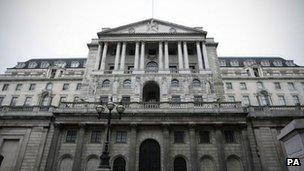UK interest rates held at 0.5%
- Published

The Bank expects the economy to "zig-zag" this year
The Bank of England has continued to hold UK interest rates at 0.5% and announced no change to its quantitative easing (QE) programme.
QE is the Bank's scheme to boost the economy by buying bonds. In February, the Bank's monetary policy committee (MPC) boosted the stimulus to £325bn.
Rates have been 0.5% for three years.
Data on Thursday showed a shock 1% fall in manufacturing in February, with other research showing the overall economy has barely grown this year.
A monthly economic estimate from the National Institute of Economic and Social Research (Niesr) suggested output grew by 0.1% in the first three months of this year, after no growth in the three months to February.
It said this implied the UK has avoided a technical recession - two consecutive quarters of negative growth.
The central bank itself has said that the UK is unlikely to enter recession this year, forecasting growth of about 1% in 2012.
But the Bank's governor, Sir Mervyn King, has warned that the economy will "zig-zag" between growth and contraction throughout the year.
Niesr said it expected to see the economic recovery take hold in 2013.
But it added that the depression - defined by it as a period when the economy is below its peak - would continue until 2014 before it hit the level of activity reached at its peak in 2008.
'Difficult call'
The decision to leave the size of the asset purchase programme unchanged was widely expected, given that the latest extension of QE runs until May.
"The focus therefore remains on whether further asset purchases will be announced next month," said Ian McCafferty, chief economic adviser to the CBI business group.
"It's a difficult judgement call, but on balance we're not expecting a further extension next month. Recent economic data has been more encouraging, and with oil prices high, there's now less certainty around how far and how fast inflation will fall."
The research consultancy, Capital Economics, said that while it did not expect an extension to QE next month , it still thought the MPC would undertake more purchases in time.
Despite Thursday's disappointing manufacturing data from the Office for National Statistics, other recent surveys have painted a more encouraging picture of the economic recovery.
The Purchasing Managers' Index (PMI) suggested that both the manufacturing and service sectors picked up in March.
The BBC's economics editor, Stephanie Flanders, describes the data as being "all over the place lately".
"But the underlying message has not changed: the recovery is still fragile, and so is the optimistic mood we have seen in global financial markets since the start of 2012," she says.
In addition, the Bank of England may have to contend with high levels of inflation in the coming months.
Inflation measured by the Consumer Prices Index (CPI) eased to 3.4% in February from its peak of 5.2% in September.
The Bank has forecast that it will be back to its target 2% by the end of the year. But at its last meeting in March, it warned that high oil prices could slow the global and UK recovery and drive up inflation.
Lowering inflation is seen as key to the recovery as it will help alleviate the squeeze on consumers and lead to a rise in spending.